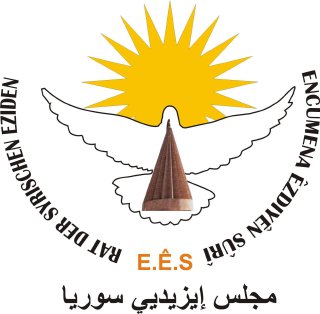Sema
Statement to the Public
On Rejecting Hate Speech, Religious Intolerance, and Death Threats Based on Religious Identity
We, a group of organizations, associations, community houses, and social, religious, and political figures concerned with Ezidi affairs and committed to the values of peaceful coexistence among all components of the Syrian people—whether in Syria, Europe, or anywhere else in the world—raise our unified voice today to condemn and reject all forms of religious extremism, as well as any discourse that promotes violence, hate, and sectarian or religious incitement.
In particular, we express our deep concern about the growing threats against Ezidis and Ezidi spiritual symbols across social media platforms. These threats are often issued by individuals who openly identify with extremist and jihadist ideologies, promoting slogans of violence, division, and killing.
A Dangerous Escalation
For some time now, we have been following with great concern the dangerous escalation in rhetoric and content shared by certain individuals who openly chant incitements to violence and promote hostility against the Ezidi people—especially Ezidis in Syria, who have always been and remain a vital and historic component of the Syrian societal fabric.
This rise in religious and sectarian agitation threatens not only the Ezidis but the security and social peace of all communities in Syria.
A Call for Responsibility and Unity
From this platform, we appeal to the wise voices among our Kurdish (Muslim) compatriots to stand firmly against this discourse. The spark of sectarian strife, once ignited, spares no one. History has proven time and again that calls to violence only breed more hatred, fear, and division within societies.
We also urge all Ezidis—regardless of their backgrounds, affiliations, or geographical identities, and particularly our youth—to avoid reactionary behavior and refrain from participating in unproductive online confrontations or video content that serve no purpose. A wrong cannot be corrected with a greater wrong.
Differences in belief or thought must not be grounds for conflict. Rather, holding fast to the values of the tolerant Ezidi faith remains a safeguard for all of us.
Responsible Use of Social Media
Let us not forget that in civilized societies, social media is a tool for empowering humanity, fostering coexistence, and building nations—not for spreading fear, hate, or revenge.
We extend our appreciation to Germany and the European Union, which have welcomed hundreds of thousands of migrants and refugees—including members of the Kurdish community—without discrimination. It is our moral and civic duty to honor this trust by respecting their laws and upholding their democratic values, which they fought hard to preserve.
In Solidarity
We declare our full solidarity with the Ezidi people, and with all religious or ethnic communities facing threats or contempt. We affirm that the laws of these countries must remain the highest and final authority for all who live within their borders. There is no place in the modern world for exclusionary ideologies or hate speech under any justification.
Issued by
A collective of activists, organizations, associations, cultural houses, and independent social figures concerned with Ezidi affairs in Syria:
Signatories:
- Ezidi Council of Syria
- Kaniya Spi Cultural and Social Association
- Ezidis of Jarablus Agreement
- The Ezidi Center in Bonn
- The Ezidi House in North Rhine
- Ezidi Cultural and Social Assembly
- The Family of Pir Ali Pir Mato
- Mr. Suleiman Jaafar (Independent)
- Lawyer Ibrahim Kalash (Independent)
- Dr. Khalid Hasso (Independent)
- Sheikh Rashid Nabo (Independent)
- Mr. Nouri Remo (Independent)
- Sheikh Adeeb Sadiq (Independent)
- Sheikh Ismail Hasso
- Adel Sabri Kinjo

